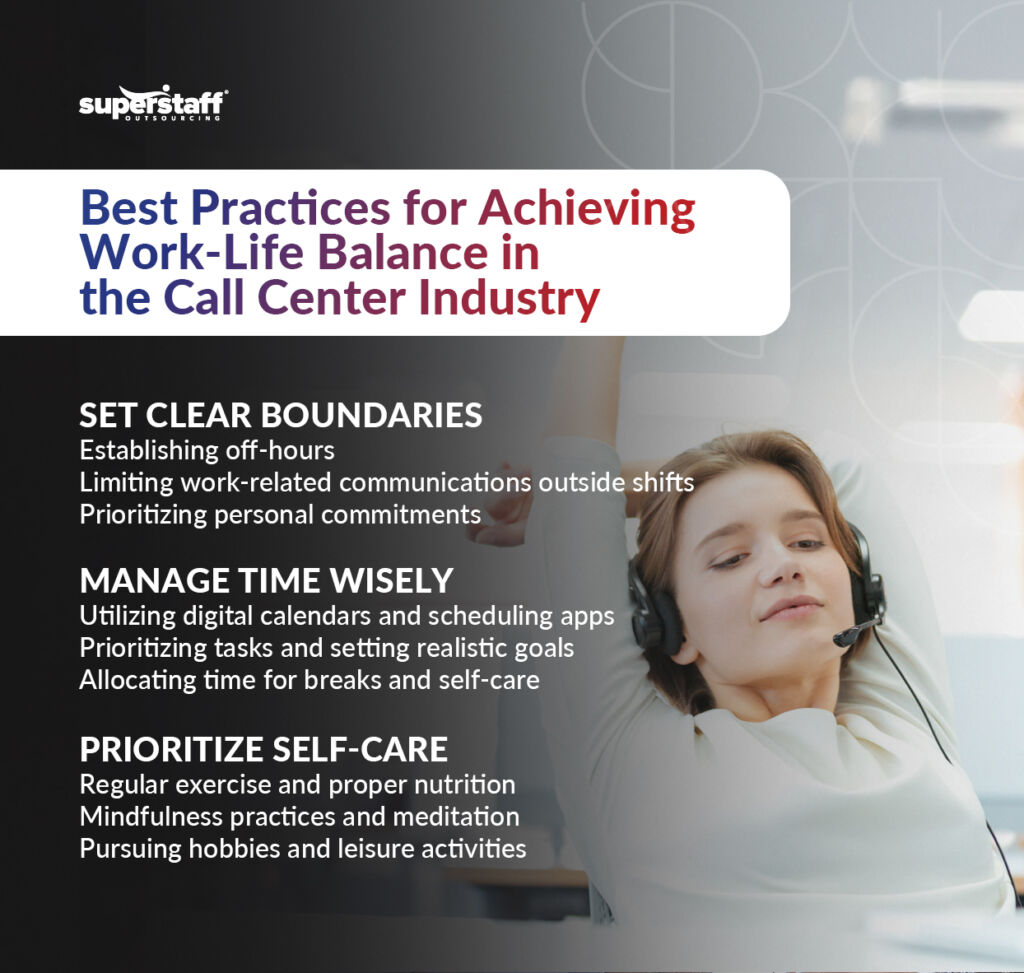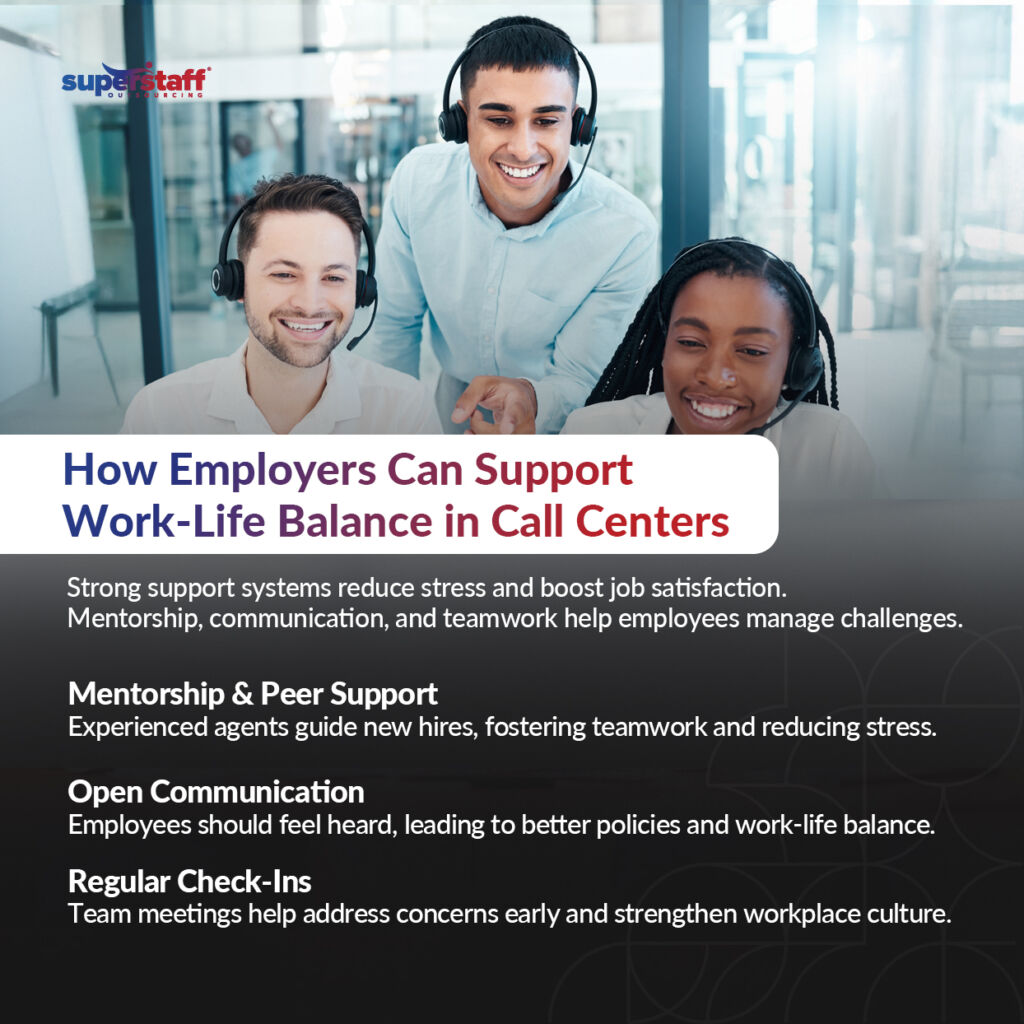
The call center industry is known for its fast-paced environment, high call volumes, and demanding schedules. With long hours, shifting schedules, and performance-based targets, achieving work-life balance can often feel challenging for BPO employees. However, striking the right balance between professional responsibilities and personal well-being is essential for job satisfaction, long-term career success, and mental health.
When employees feel overwhelmed, it can lead to burnout, decreased productivity, and even a decline in overall health. On the other hand, maintaining a healthy work-life balance can boost motivation, improve job performance, and enhance overall well-being. But how can call center professionals navigate these challenges while making time for themselves?
In this guide, we’ll explore practical and actionable tips to help BPO employees better manage their time, reduce stress, and find fulfillment at work and in their personal lives. Whether you’re working night shifts, handling back-to-back calls, or striving to meet KPIs, these strategies will empower you to create a more balanced and rewarding career in the call center industry.

What Is Work-Life Balance?
Work-life balance means prioritizing personal time and relationships without neglecting your professional responsibilities . It’s about creating a sustainable routine that prevents work from overshadowing your overall well-being and vice versa.
A healthy work-life balance allows individuals to meet career goals without sacrificing physical and mental health, hobbies, or quality time with family and friends. Achieving this balance can be particularly challenging for call center employees due to demanding schedules, night shifts, and high-pressure environments.
However, when properly managed, it leads to increased job satisfaction, better productivity, and overall well-being. By setting boundaries, prioritizing time management, and incorporating self-care practices, BPO professionals can create a fulfilling lifestyle supporting their career and personal lives.
Navigating the Challenges of Work-Life Balance in Call Centers
Understanding the unique challenges of work-life balance in the call center industry is the first step toward improving it. Unlike traditional 9-to-5 jobs, call center roles often require employees to work irregular hours, including night shifts, weekends, and holidays, to provide 24/7 support to global clients. This unpredictable schedule can make it challenging to maintain a steady routine, spend time with family, or prioritize personal well-being.
Additionally, the high-pressure environment—where meeting performance metrics, handling demanding customers, and managing high call volumes are daily expectations—can lead to stress, burnout, and fatigue if not adequately managed. Without the right strategies, employees may struggle to disconnect from work, leading to exhaustion and reduced job satisfaction.
However, by recognizing these challenges and implementing proactive solutions, call center professionals can take control of their schedules, set boundaries, and create a sustainable balance between their careers and personal lives.
Long Shifts and Night Work
Long shifts and night work are prevalent in the call center industry, often leading to significant health challenges for employees. Studies have shown that working more than 11 hours a day increases the risk of heart attack by 67% compared to shorter working hours.
Many call centers operate 24/7 to accommodate global clients, requiring employees to work long hours, rotating shifts, and even overnight schedules. This irregular work pattern can disrupt sleep cycles, making it challenging to maintain a consistent routine.
Over time, it can lead to fatigue, decreased energy levels, and challenges balancing personal commitments, such as family responsibilities or social activities. At the same time, these demanding schedules can disrupt sleep patterns, contributing to chronic sleep deprivation, which has been linked to various health issues, including heart disease, obesity, and diabetes.
High-Pressure Customer Interactions
Handling back-to-back calls with demanding customers can take an emotional toll on BPO employees. Call center agents are often required to resolve complaints, de-escalate conflicts, and meet strict performance metrics like average handle time and customer satisfaction scores. This constant pressure can increase stress levels, leading to burnout if employees don’t have adequate time to decompress and recharge. A survey revealed that 74% of contact center agents are at risk of burnout.
Additionally, 96% of agents report feeling stressed weekly, with many handling more complex calls. The emotional labor in managing continuous high-pressure interactions without sufficient recovery time underscores the critical need for effective stress management and organizational support to prevent burnout and retain talent in the call center industry.
Limited Personal Time
With shifting schedules and overtime requirements, call center employees may struggle to carve out personal time for relaxation, hobbies, or social engagements. The demanding nature of shift work can disrupt family relationships and social life, leading to increased work-life conflict.
Work can easily spill over into personal life, making it difficult to maintain meaningful relationships or engage in self-care. This imbalance can result in higher fatigue levels and psychological symptoms, further diminishing overall well-being. Without setting boundaries, the risk of exhaustion and job dissatisfaction increases, ultimately affecting work performance and overall well-being.
Drawing the Line: Protecting Personal Time in Call Center Jobs
Setting clear boundaries between work and personal life is essential for maintaining work-life balance and preventing burnout. Call center jobs often come with unpredictable schedules and demanding workloads, making it easy for job responsibilities to spill into personal time.
Without defined limits, stress and exhaustion can build up, leading to long-term health issues and reduced job satisfaction. Employees can protect their well-being and maintain a healthier balance by establishing strict work hours, taking scheduled breaks, and fully disconnecting after shifts.
Employers also play a key role in fostering this balance by promoting a culture that respects break times, encourages the use of paid time off, and prevents unnecessary after-hours work. Prioritizing personal time improves mental health and enhances productivity and job performance.
Establishing Off-Hours
One of the best ways to maintain work-life balance in call center jobs is by setting clear off-hours. Without a defined end to the workday, job responsibilities can easily creep into personal time, leading to stress and burnout. Creating firm boundaries ensures employees can recharge and return to work feeling refreshed and productive.
How to Set Clear Off-Hours:
- Define a firm work cut-off time – Log out of systems, turn off work notifications, and step away from work-related tasks.
- Stick to your schedule – Avoid working beyond your shift unless necessary.
- Create a post-work routine – Engage in activities that help signal the transition from work to personal time, such as exercising, reading, or spending time with family.
- Communicate boundaries – Let colleagues and managers know your availability outside of scheduled hours.
Limiting Work-Related Communications Outside Shifts
Constant work notifications can make disconnecting difficult, leading to stress and burnout. When call center employees are expected to stay available beyond their shifts, personal time becomes blurred with work, making it harder to relax and recharge. Establishing boundaries around work communication is essential for maintaining a healthy work-life balance.
How Employees Can Set Boundaries:
- Turn off notifications after work – Mute work-related messaging apps and emails to avoid unnecessary distractions.
- Use separate devices for work and personal use – If possible, keep a dedicated work phone or email to prevent work messages from intruding on personal time.
- Communicate availability clearly – Let colleagues and managers know that once a shift ends, you are unavailable unless it’s an emergency.
- Resist the urge to check emails – Avoid responding to work messages outside of designated hours to reinforce boundaries.
Prioritizing Personal Commitments
Balancing call center jobs with personal responsibilities requires more than good intentions—it requires proactive time management. Without setting aside time for family, self-care, and hobbies, work can quickly consume every aspect of life, leading to stress and burnout. Treating personal commitments with the same level of importance as work responsibilities ensures a healthier, more fulfilling routine and promotes a better work-life balance.
How Employees Can Prioritize Personal Time
- Schedule personal time like a work task – Block out time for family, exercise, or hobbies just as you would for meetings and deadlines.
- Set clear boundaries – Let colleagues and supervisors know when you are unavailable due to personal commitments.
- Unplug from work completely – Turn off work notifications and avoid checking emails outside work hours.
- Use breaks wisely. To recharge during work hours, step away from screens, stretch, or take a short walk.
The Power of Self-Care: Sustaining Energy and Focus
Prioritizing self-care is essential for maintaining work-life balance in call center jobs, where long hours and high-pressure tasks can drain energy and focus. Employees who neglect their well-being become more vulnerable to stress, fatigue, and burnout.
Incorporating physical and mental health routines—such as regular exercise, mindfulness practices, and engaging in hobbies—can significantly boost resilience and improve overall job performance. By making self-care a non-negotiable part of daily life, employees can stay energized, focused, and motivated at work and in their personal lives.
Regular Exercise and Proper Nutrition
Staying physically active and eating well are foundational to sustaining energy levels and mental clarity. Exercise improves mood, enhances endurance, and reduces stress—essential factors for employees in demanding call center jobs. A balanced diet, rich in whole foods, is crucial in maintaining stamina and focus. Simple habits like stretching between calls, taking short walks, and choosing nutritious meals over processed snacks can significantly affect overall well-being.
Mindfulness Practices and Meditation
Practicing mindfulness and meditation can help call center employees to manage stress and maintain mental clarity. The repetitive nature of handling customer inquiries and complaints can be emotionally draining. Still, mindfulness techniques—such as deep breathing, guided meditation, or short mental breaks—can improve focus and emotional resilience. Taking a few minutes each day to reset mentally can prevent burnout and enhance overall work performance.
Pursuing Hobbies and Leisure Activities
Outside work, engaging in hobbies and leisure activities provides a much-needed escape from daily stressors. Whether it’s reading, painting, playing music, or spending time outdoors, having an enjoyable activity to look forward to can improve overall happiness and job satisfaction. These activities help employees detach from work, recharge mentally, and return to their shifts feeling refreshed and motivated.
Mastering Time Management for a Better Work-Life Balance
Effective time management is key to balancing the demands of call center jobs while making time for personal activities. A well-structured daily routine reduces stress, increases productivity, and prevents work from consuming all aspects of life. By organizing tasks efficiently, employees can complete their responsibilities within their scheduled hours, leaving more time for relaxation, family, and self-care. When employees take control of their time, they create a work environment supporting career success and personal well-being.
Utilizing Digital Calendars and Scheduling Apps
Leveraging digital tools like Google Calendar, Outlook, or scheduling apps helps employees stay on top of their workload. These tools allow agents to plan their day effectively, set reminders for important tasks, and block out time for essential activities. Visualizing a structured schedule prevents last-minute stress and ensures a smooth workflow.
Prioritizing Tasks and Setting Realistic Goals
Not all tasks carry the same urgency, and identifying priorities is essential for maintaining efficiency. Employees should categorize tasks based on importance and deadlines, focusing on high-impact activities first. Setting realistic, achievable goals prevents feelings of overwhelm and helps employees stay motivated throughout the workday.
Allocating Time for Breaks and Self-Care
Working nonstop leads to burnout, reduced focus, and decreased productivity. Scheduling regular breaks throughout the shift allows employees to recharge and return to tasks with renewed energy. Short walks, deep breathing exercises, or simply stepping away from the desk for a few minutes can significantly improve concentration and overall well-being.
By incorporating these time management strategies, call center employees can enhance their productivity while maintaining a sustainable work-life balance, ensuring professional growth and personal fulfillment.
How Employers Can Help Build a Supportive Work Environment for Better Work-Life Balance

A strong support system in the workplace is crucial for maintaining work-life balance in call center jobs. When employees feel supported by their peers and leadership, they experience lower stress levels, higher job satisfaction, and a stronger sense of belonging. A culture that encourages teamwork, mentorship, and open communication creates a positive environment where employees can manage challenges effectively. By fostering supportive workplace relationships, companies can help employees navigate the demands of their roles while maintaining a sense of balance and well-being.
Mentorship and Peer Support Programs
Having access to mentorship and peer support programs can make a significant difference in reducing workplace stress. Experienced employees can guide newer agents, helping them develop strategies to manage workload efficiently and handle challenging customer interactions. Peer support also fosters camaraderie, allowing employees to share experiences, exchange advice, and build meaningful connections that make work more fulfilling.
Open Communication Channels with Supervisors
Employees should feel comfortable discussing workload concerns, career growth, and personal challenges with their supervisors. Open communication fosters trust and ensures that management understands the realities employees face, making it easier to implement supportive policies. When supervisors encourage dialogue and actively listen, they create an environment where employees feel valued and empowered to maintain a healthy work-life balance.
Regular Team Check-Ins and Feedback Sessions
Frequent team check-ins and feedback sessions provide a structured way for employees to voice concerns, celebrate wins, and address potential stressors before they escalate. These sessions allow teams to collaborate on solutions, strengthen relationships, and build a more cohesive work culture. When teams regularly connect, they create a supportive atmosphere that reduces workplace tension and enhances overall well-being.
Looking for Jobs With the Best Work-Life Balance? Head Over to SuperStaff
Achieving a healthy work-life balance isn’t just a personal goal—it’s essential for long-term success and well-being. At SuperStaff, we recognize that the best customer service professionals thrive in an environment that values personal time, flexibility, and professional growth.
As a leader in Philippines customer service outsourcing, we are committed to creating a workplace that supports employees in managing their schedules, setting boundaries, and prioritizing self-care.
If you’re already part of our team, take advantage of our resources to maintain balance and stay at your best. If you’re a job seeker looking for a company that genuinely cares about its employees, SuperStaff offers a career where you can grow professionally while enjoying a fulfilling personal life.
Join SuperStaff today and be part of a company that values career success and well-being.






